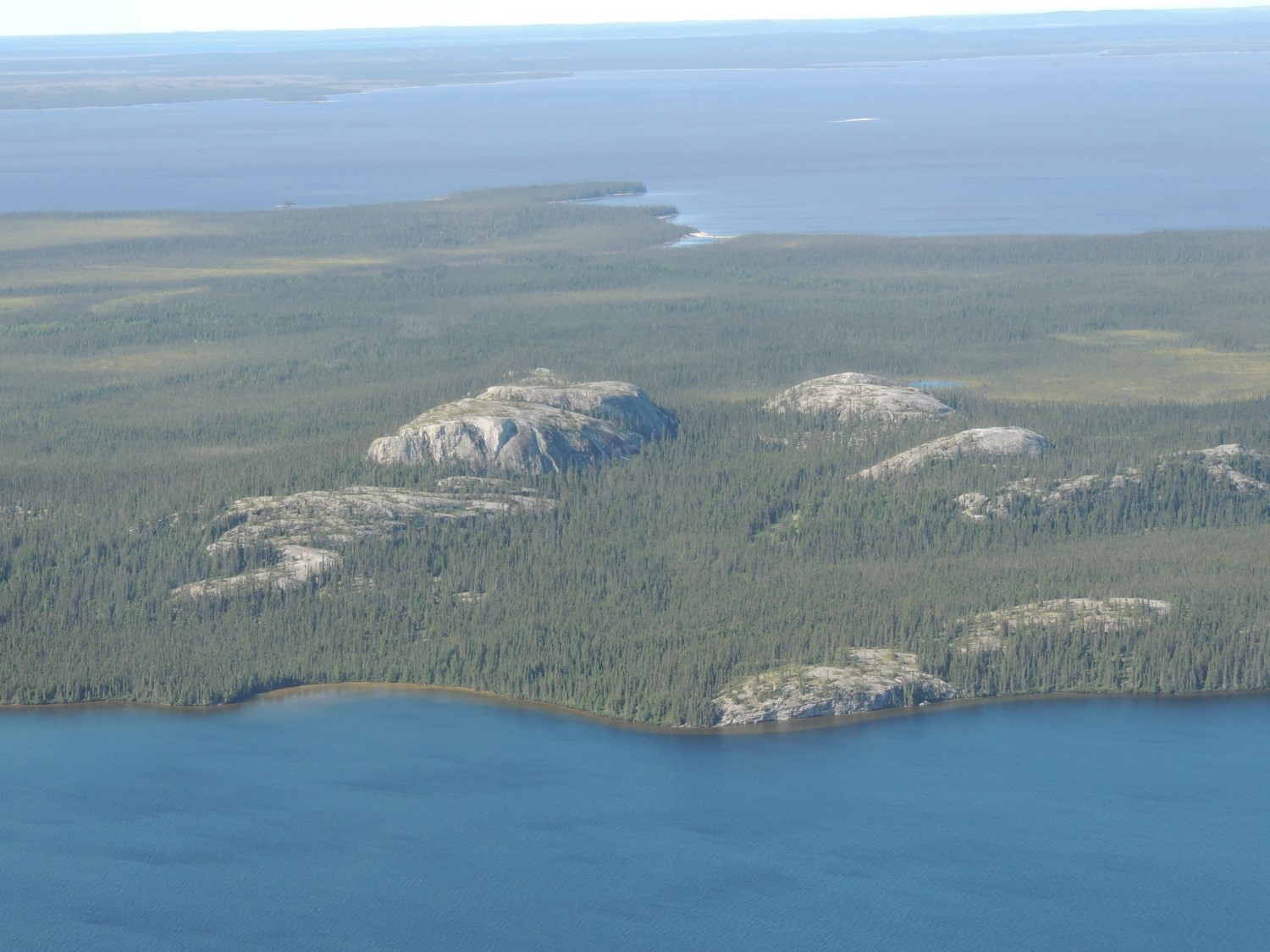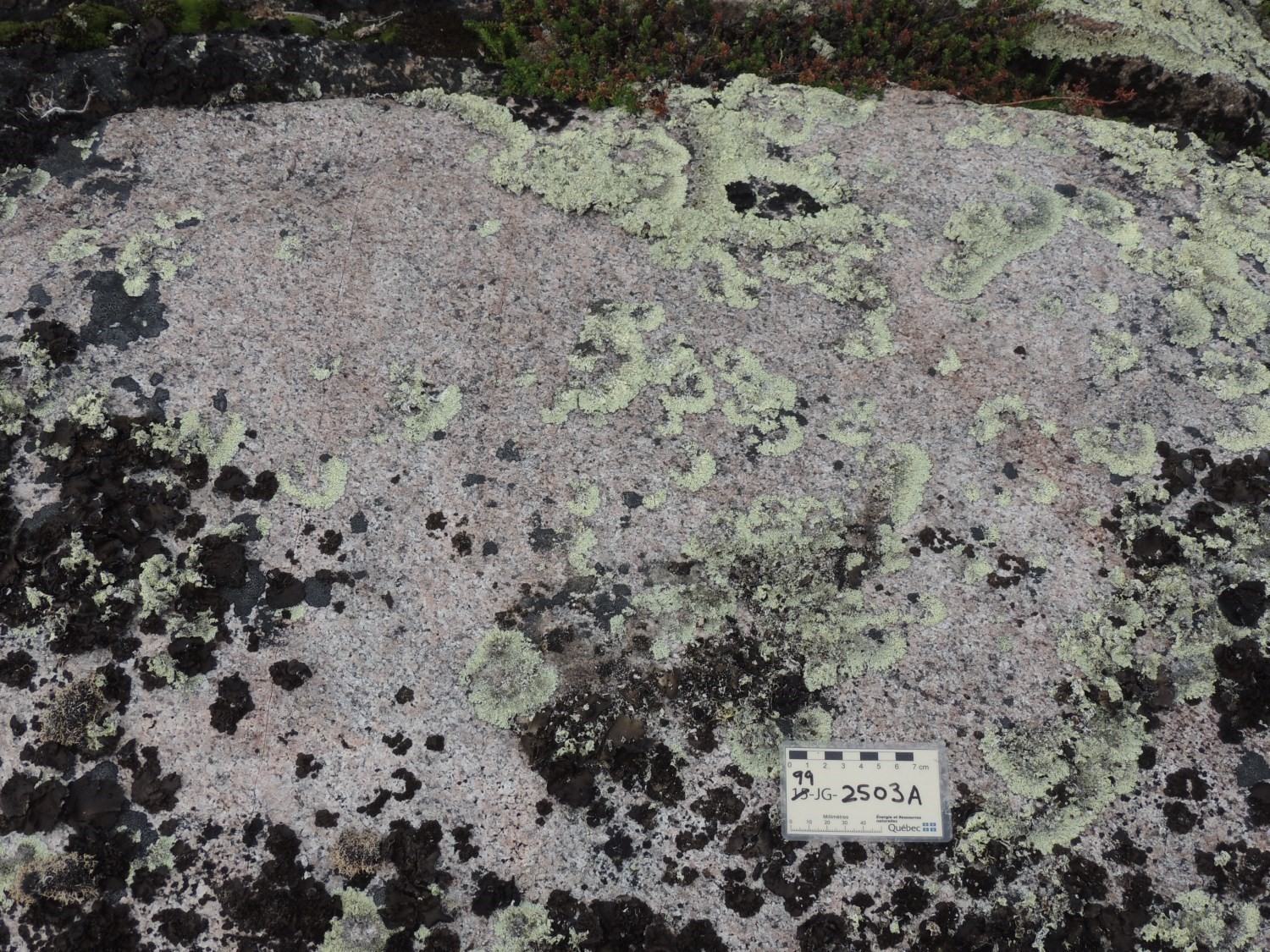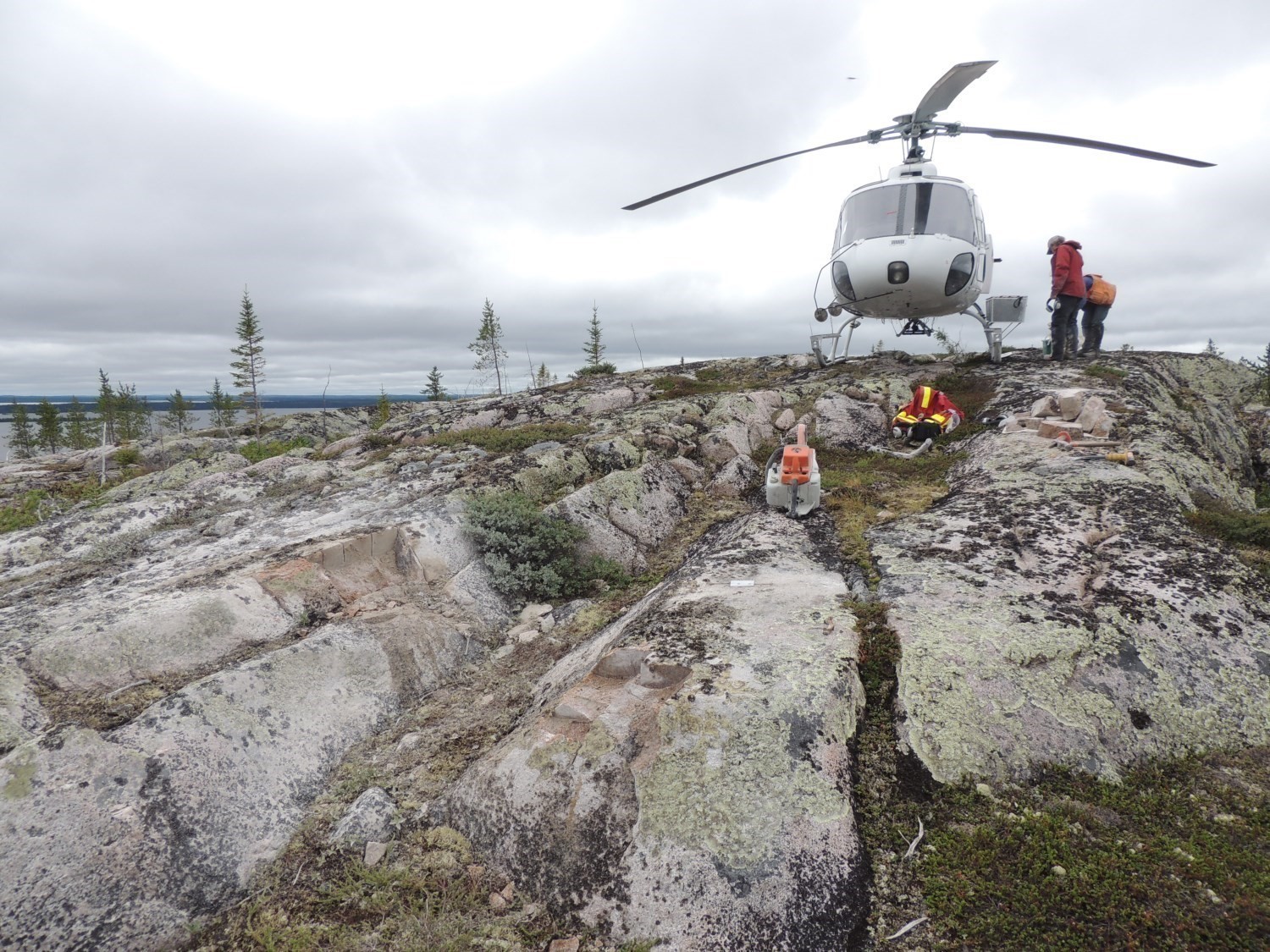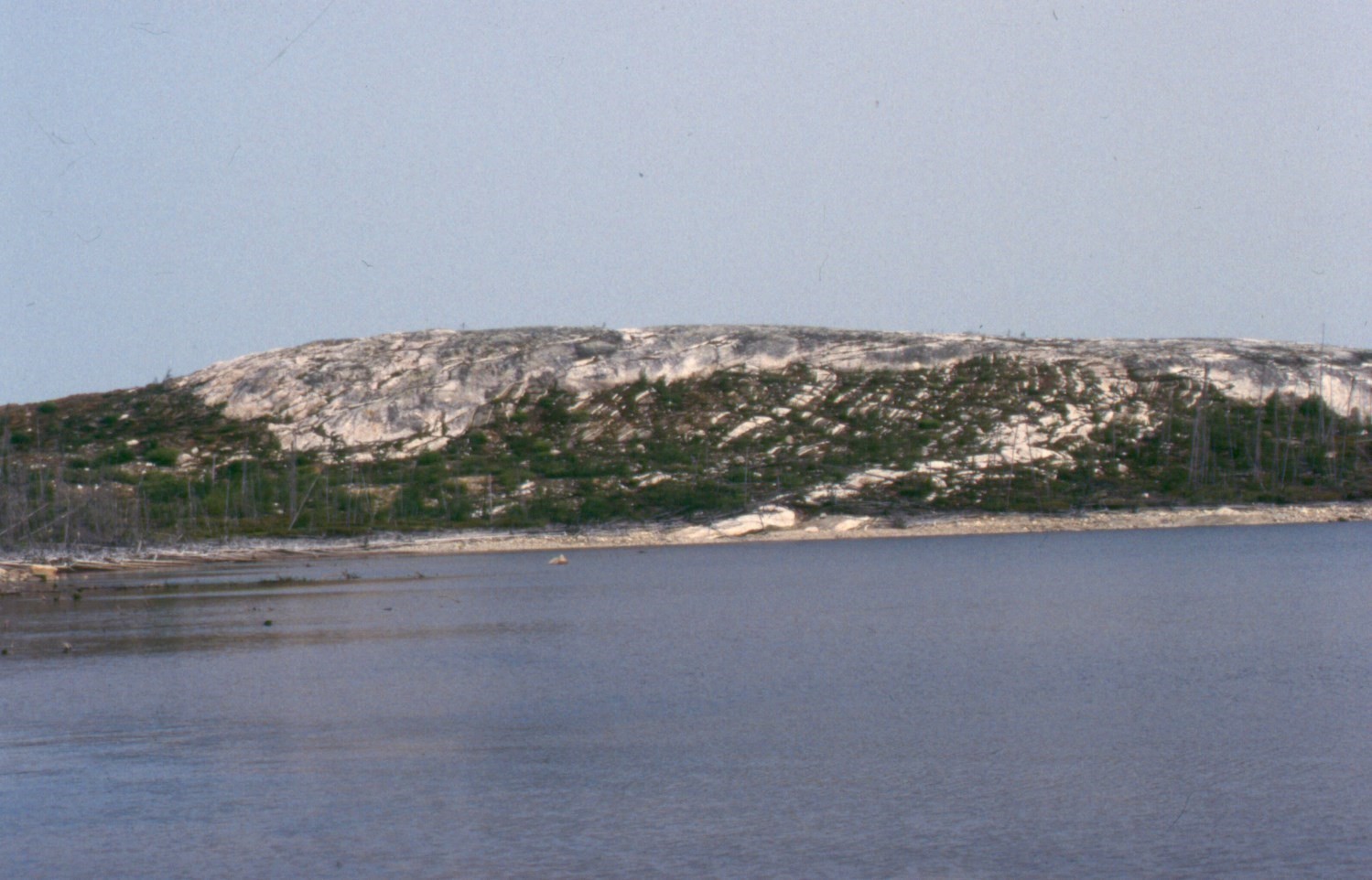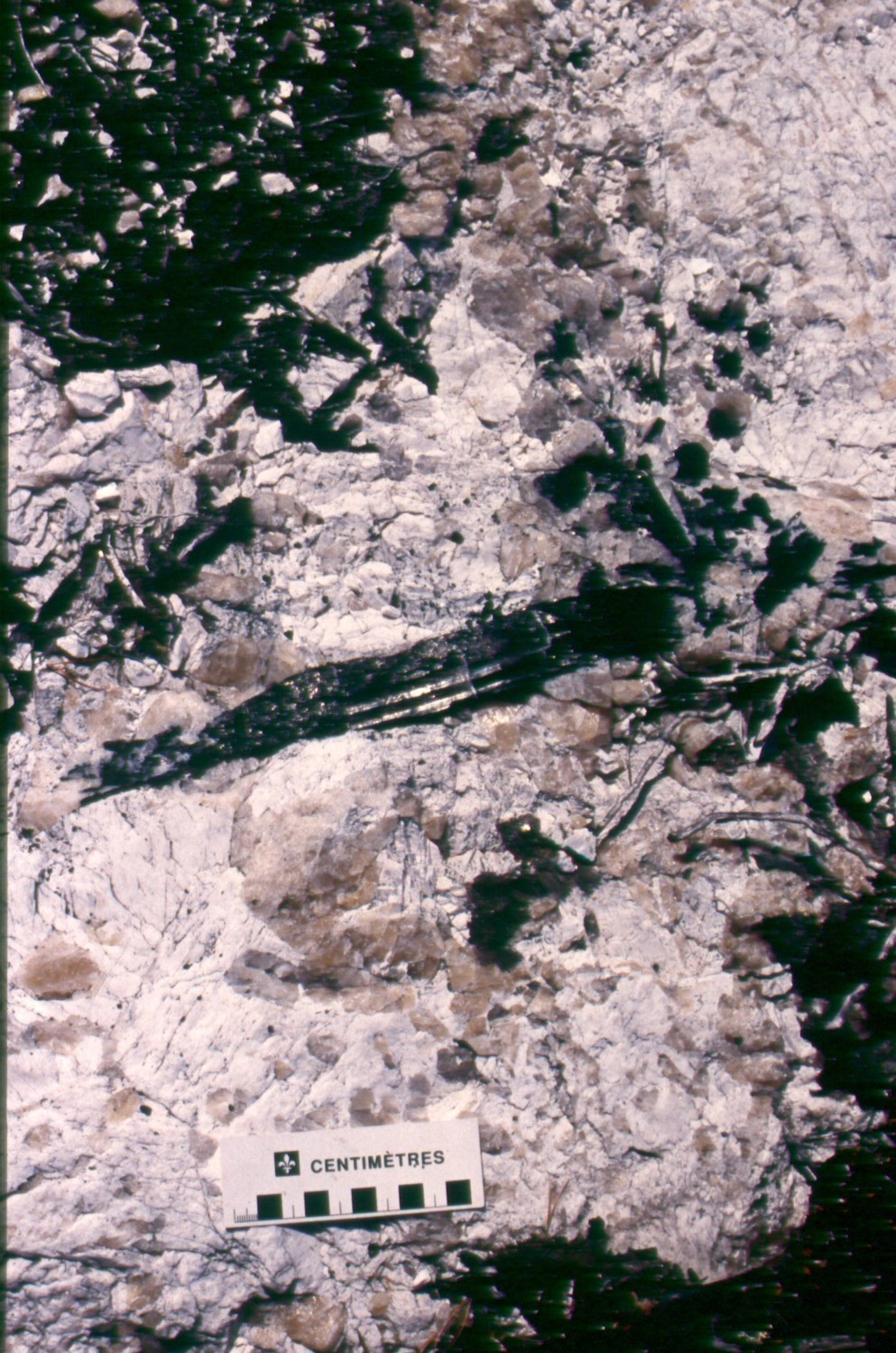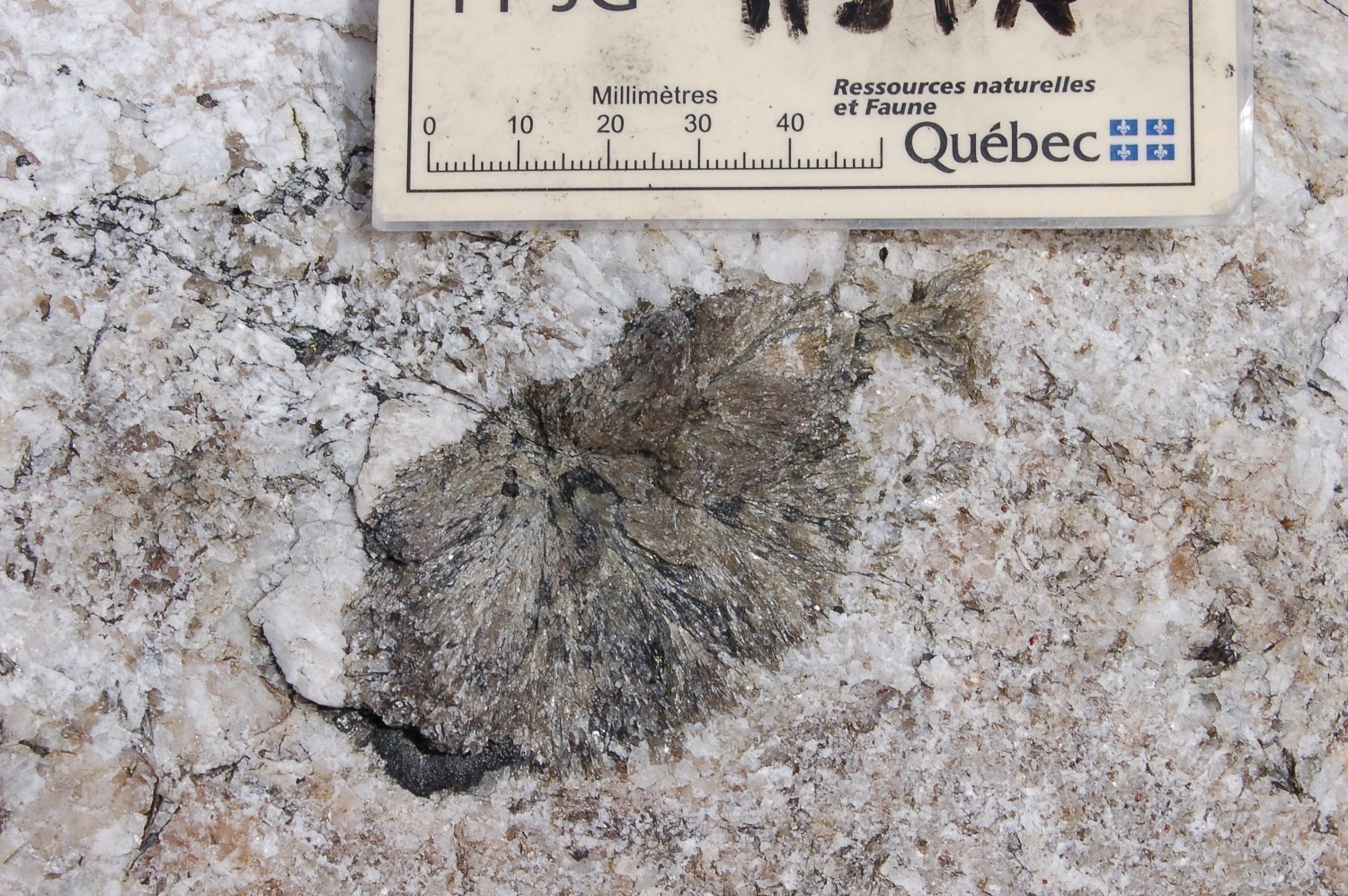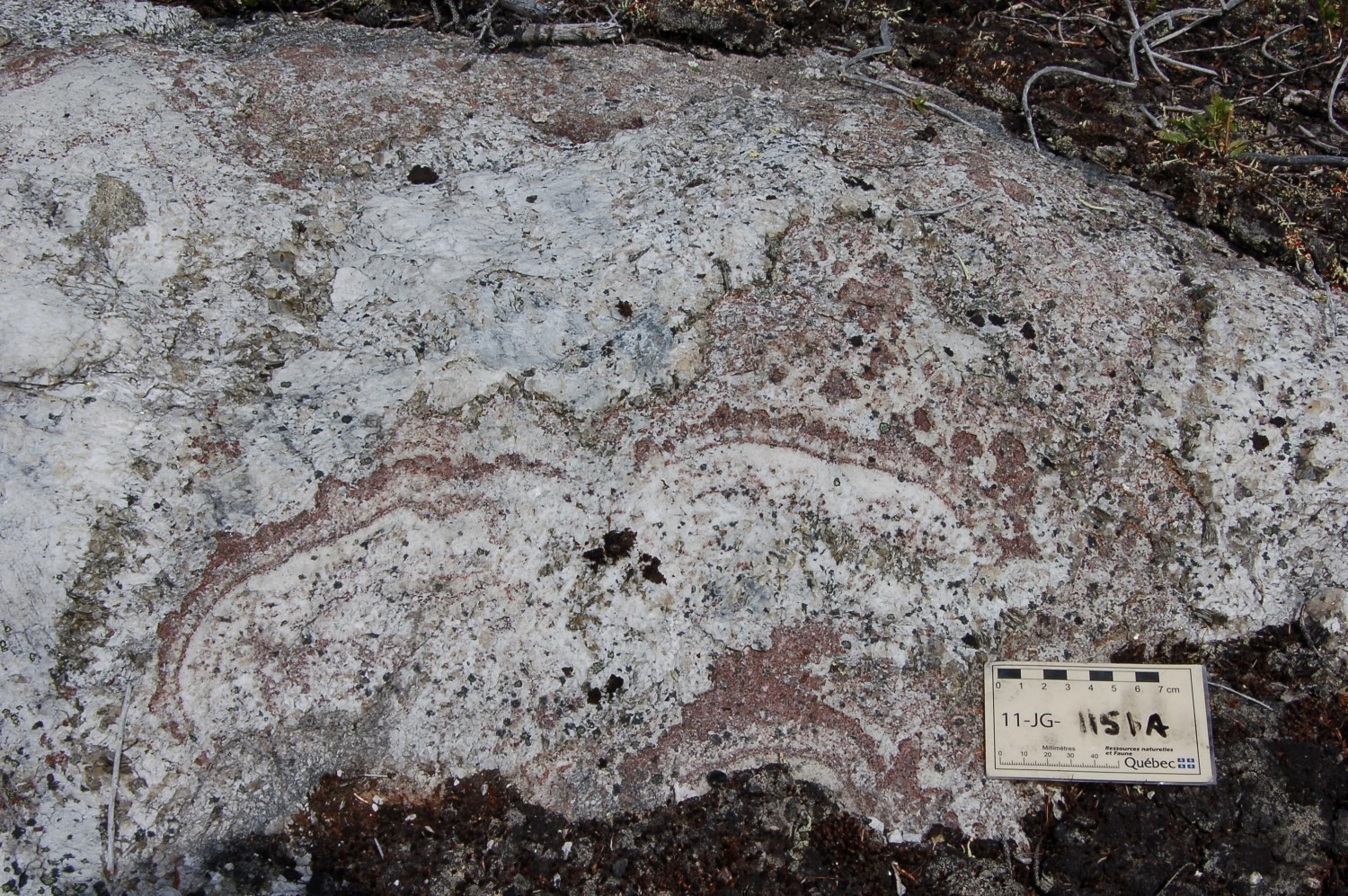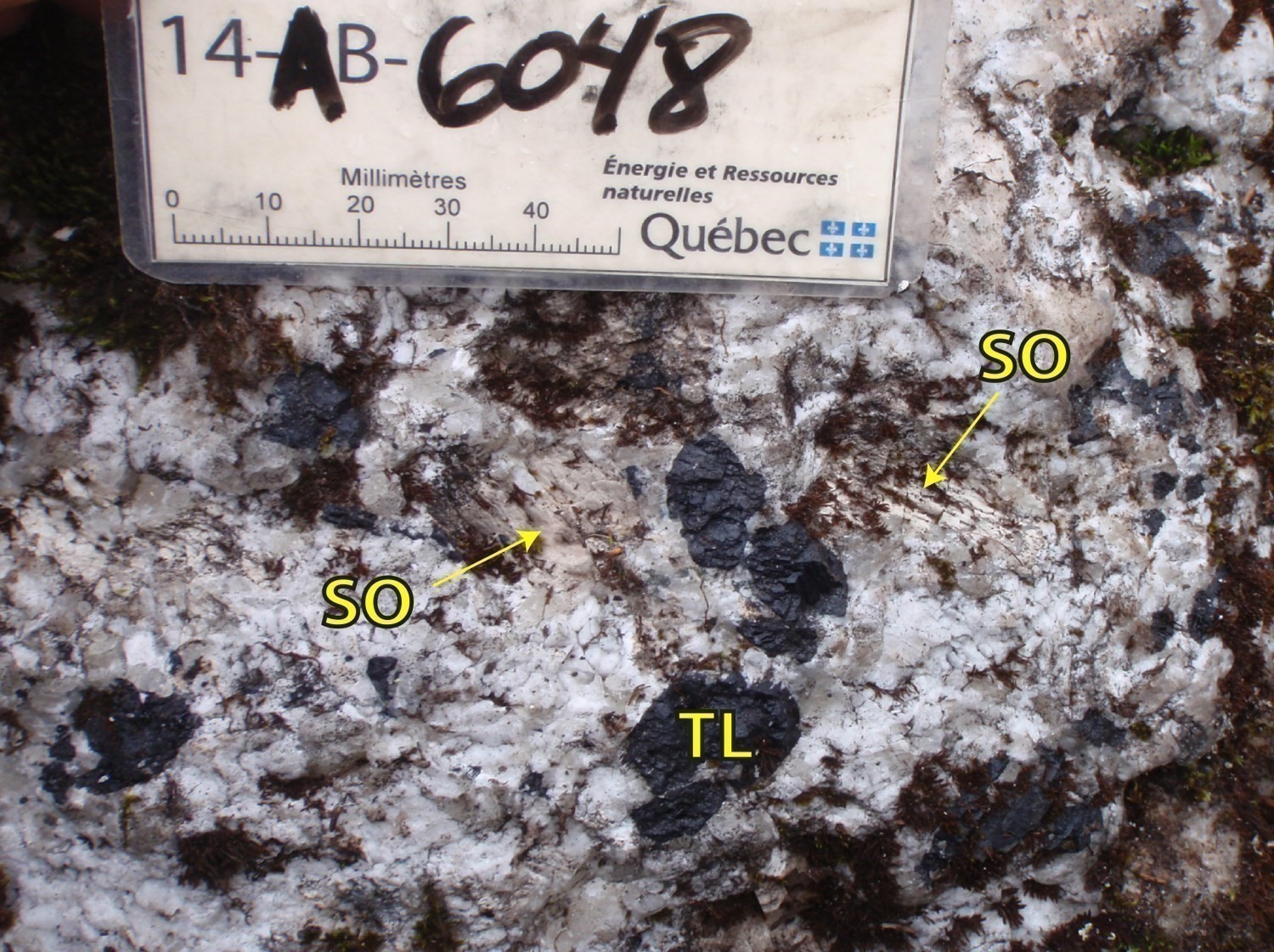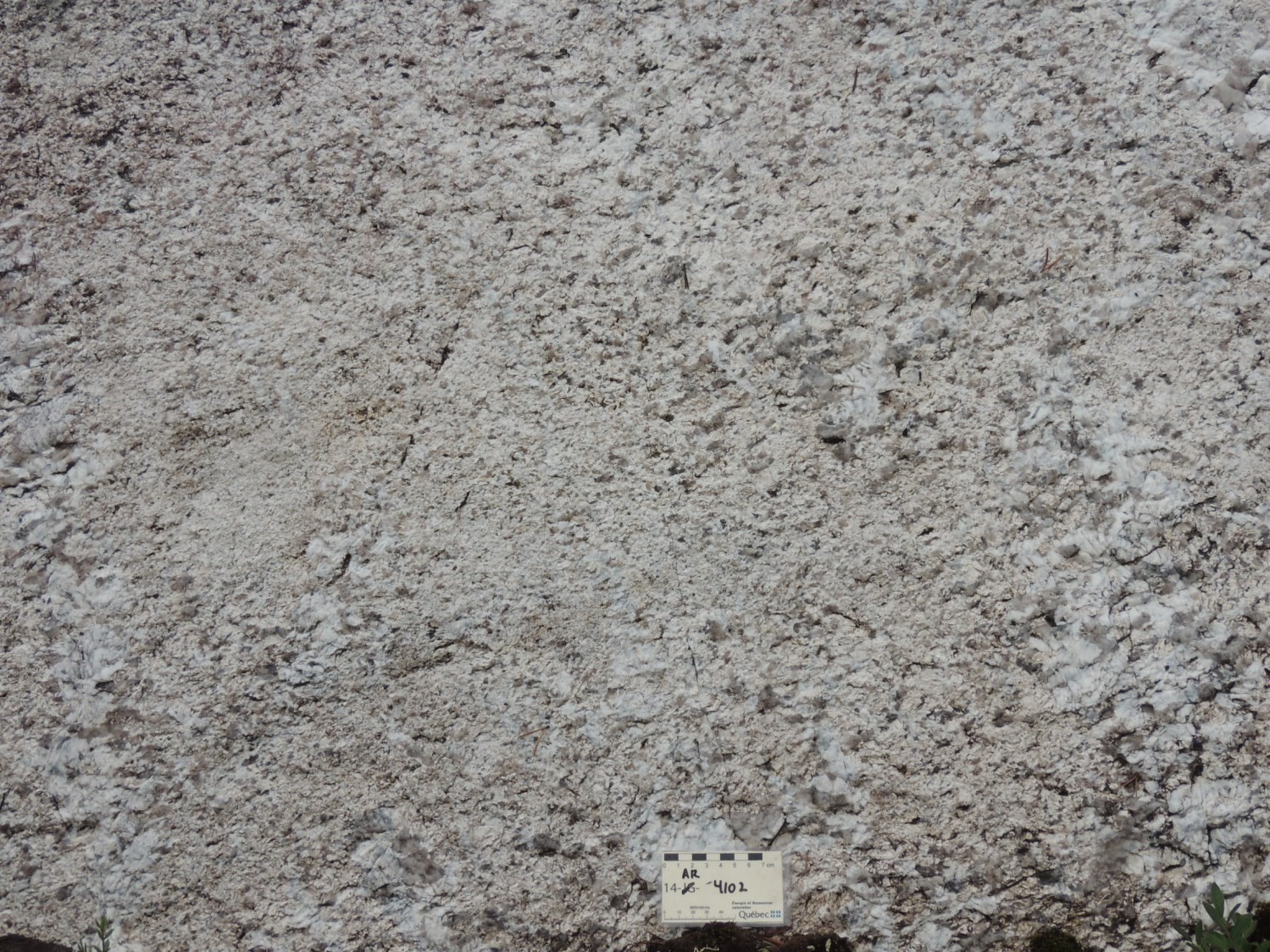
DISCLAIMER: This English version is translated from the original French. In case of any discrepancy, the French version shall prevail.
| Author(s): | Goutier et al., 1999 |
| Age: | Neoarchean |
| Stratotype: | Outcrops 1999-JG-2503, 1995-LP-90 and 2014-AB-6048 are the reference outcrops for units nAvcr1, nAvcr2 and nAvcr3, respectively |
| Type area: | The reference intrusion is a pluton (27 km by 78 km) located in the Vieux Comptoir Lake area (NTS sheets 33C13 and 33C14). Outcrops along the James Bay Road (kilometres 470 to 498) are representative of unit nAvcr1, while the typical outcrops of white pegmatitic granite with biotite, muscovite, tourmaline and garnet of unit nAvcr2 are exposed near the shores of Sakami Lake (sheet 33F02) |
| Geological province: | Superior Province |
| Geological subdivision: | La Grande and Opinaca subprovinces |
| Lithology: | Granite |
| Category: | Lithodemic |
| Rank: | Suite |
| Status: | Formal |
| Use: | Active |
None
Background
The Vieux Comptoir Granite unit (Avcr) was introduced by Goutier et al. (1999) to describe a package of granite intrusions that are not or slightly deformed, medium to coarse-grained, locally pegmatitic and poor in mafic minerals (less than 10% biotite and hornblende ± tourmaline ± garnet). These intrusions with a white to pinkish patina form numerous white hills visible in the landscape, on aerial photographs of the Sakami Lake area (Goutier et al., 2000) or on satellite images. The “Vieux Comptoir Granite” lithodeme was rose to the rank of a suite in 2017 with the name of “Vieux Comptoir Granitic Suite” as Géologie Québec’s mapping work after 2008 in sheets 33G, 33H and 23D showed the presence of these granites. This new designation, made when the unit was added to the Quebec Stratigraphic Lexicon, is based on the fact that this unit consists of several intrusions spread over a large area (13,650 km²) and over a distance of 530 km along an EW axis.
Informal units were defined as the geological mapping of the La Grande and Opinaca subprovinces evolved (Goutier et al., 1999, 2000; Gigon and Goutier, 2017; Goutier 2018; Burniaux et al., 2019; Gigon et al., 2020). Forming a whole, this granite unit was later split into informal units to highlight pegmatitic facies with different mineralogical assemblages.
Description
The Vieux Comptoir Granitic Suite represents a package of syntectonic to late-tectonic granites present in the La Grande, Opinaca and Opatica subprovinces. These rocks are characterized by a usually pegmatitic texture, a granitic composition and the presence of biotite, muscovite, tourmaline and garnet. Locally, hornblende, beryl or spodumene are present. These granites usually cut the main foliation and migmatitic bands of the paragneiss of the Laguiche Complex. This suite is divided into three informal units that differ in composition, texture and structure.
Vieux Comptoir Granitic Suite (nAvcr): Undifferentiated Granite Package that may Contain Phases of Pegmatitic Granite, K-feldspar Granite and Spodumene Granite
Unit nAvcr is an undifferentiated package of granite, pegmatitic granite, K-feldspar granite and, more rarely, spodumene granite. It corresponds to the first units of the Vieux Comptoir Granite recognized during geological mapping of sheet 33F in the 1990s in the southern part of sheets 33F02, 33F03 and 33F04 (Goutier et al., 1999, 2000). This unit is used for naming granitic plutons of heterogeneous grain size which outcrop intensively and cannot be subdivided.
Vieux Comptoir Granitic Suite 1 (nAvcr1): Biotite ± Magnetite Granite; Biotite-Magnetite ± Hornblende ± Epidote Granite, Massive to Slightly Foliated
Unit nAvcr1 is the largest package of the Vieux Comptoir Granitic Suite. It consists of a biotite ± magnetite granite and a biotite-magnetite ± hornblende ± epidote granite, massive to slightly foliated. These sweet pink granites are typically fine to medium-grained, locally pegmatitic. They are composed of quartz, plagioclase and K-feldspar in equal proportion and of a small amount of mafic minerals. In the area of sheets 33F02 and 33F03, seven hornblende occurrences were observed in the northeast portion of the large pluton of unit nAvcr1. Since the latter are disseminated in the pluton, it is not possible to group them into a subunit.
Vieux Comptoir Granitic Suite 2 (nAvcr2): White Pegmatitic Granite; K-feldspar-Biotite ± Muscovite ± Tourmaline ± Garnet ± Beryl Pegmatitic Granite; Muscovite-Garnet Granite, Banded, Usually Pegmatitic
Unit nAvcr2 outcrops as rounded hills without vegetation. It is characterized by the abundance of granite of various grain sizes rich in K-feldspar (orthose and microcline with local varieties containing adularia or amazonite) and a typical mineral assemblage including biotite, muscovite, black tourmaline, pink garnet and blue or green apatite. Magnetite is present in some places. Tourmaline crystals can reach 25, whereas orthose crystals reach 50 cm and biotite crystals up to 10 cm. Beryl is observed locally as crystals from a few millimetres to 15 cm in length. Typically white or slightly pink granite is distinguished by pegmatitic and graphic textures. Decimetric to metric horizons of pegmatite contain in places centimetric rosettes of muscovite. Gold was observed in the heavy mineral concentrate of the sample of outcrop 1995-LP-90 used for U-Pb isotopic dating (sheet 33F02; Jean David, personal communication), as well as in thin section of samples of the Orfée gold mineralized zone (sheet 33G06; Bogatu and Huot, 2016).
In places, granite exhibits magmatic banding underlined by grain size and modal variations. This structure is manifested by alternating fine to medium-grained centimetric to decimetric horizons associated with bands or laminae rich in garnet, muscovite and tourmaline. The composition of these bands varies between K-feldspar granite and syenogranite. Although the rock does not appear deformed at megascopic scale, a large number of microfractures and a cataclase of feldspar crystals are commonly observed in thin section. Dykes of unit nAvcr2 cut granites of unit nAvcr1.
Vieux Comptoir Granitic Suite 3 (nAvcr3): Spodumene Granite
Unit nAvrc3 is composed of K-feldspar granite which is distinguished from that of unit nAvcr2 by the abundance of spodumene. Several outcrops of this unit correspond to lithium (Mia-Li1, Mia-Li2, Adina, Cancet) or beryl (Boily and Gosselin, 2004) mineralization. For example, the Adina mineralized zone (sheet 33H08) consists of massive coarse-grained or pegmatitic granite containing centimetric crystals of tourmaline (1-6%) and pink and yellow-beige spodumene (2-3%) associated with traces of apatite. The contact of this granite with volcanics of the Trieste Formation is distinguished by the presence of a decimetric rim of massive tourmaline (Burniaux et al., 2019). Geochemical study indicates that it is calc-alkaline granite, peraluminous, from an S-type magma with an intraplate signature (Guemache et al., 2017). On sheet 33H12, small intrusions (e.g., 30 m by 150 m) contain crystals nearly one metre in length (92 Resources news release, October 2017).
Thickness and Distribution
The Vieux Comptoir Granitic Suite (nAvcr) represents a package of granitic intrusions of decametric to kilometric magnitude recognized in the La Grande, Opinaca and Opatica subprovinces (Goutier et al., 2000, Bandyayera et al., 2011; Goutier et al., 2021). These granites, which are generally not or slightly deformed, are present in sheets 33E to 23D over a distance of nearly 530 km. Their dimensions vary from a few metres for the smallest intrusions to several tens of kilometres for the largest ones, (e.g., 27 km by 78 km, sheets 33C13 to 33F02; 5 km by 60 km, sheets 23D12 and 23D11).
Unit nAvcr1 is located primarily at the east and west ends of the Opinaca Subprovince. Most of the nAvcr2 granite intrusions occurred along the boundary between the La Grande and Opinaca subprovinces (e.g., Sakami Lake area, sheet 33F02; Léran Lake area, sheet 23D12). Unit nAvcr3 is recognized in three areas: 1) near Miakadow Lake (sheet 33F04); 2) as a pluton 1200 m long by 350 m wide in the SW portion of sheet 33H08; and 3) in the area of Léran Lake, where it is not exposed but visible as erratic blocks.
Dating
The Vieux Comptoir Granitic Suite is one of the youngest Archean units in the Eeyou Itschee James Bay region. Samples from sheets 33C and 33E were dated to 2618 +18/-13 Ma (nAvcr1) and 2618 ±2 Ma (nAvcr2) (Goutier et al., 1999, 2000). A pegmatitic granite sample from an Orfée mineralized zone stripping (sheet 33G06) yielded an age of 2613.61 ±0.44 Ma (Bogatu and Huot, 2016). These ages are comparable to those obtained from pegmatitic dykes in the Roberto gold deposit (Fontaine et al., 2015). Monazite datings indicate that crystallization may have begun around 2657 Ma (Goutier et al., 1999).
| Sample Number | Isotopic System | Mineral | Crystallization Age (Ma) | (+) | (-) | Inherited Age (Ma) | (+) | (-) | Metamorphic Age (Ma) | (+) | (-) | Reference(s) |
| LG95-KM471 | U-Pb | Zircon | 2618 | 18 | 13 |
Goutier et al., 1999 |
||||||
| LG95-KM471 | U-Pb | Monazite | 2657 | 4 | 4 | Goutier et al., 1999 | ||||||
| 95-LP-090 | U-Pb | Zircon and monazite | 2618 | 2 | 2 | Goutier et al., 2000 | ||||||
| 95-LP-090 | U-Pb | Zircon | 2846 | 21 | 21 | Goutier et al., 2000 | ||||||
| 95-LP-090 | U-Pb | Zircon | 2720 | Goutier et al., 2000 | ||||||||
| 95-LP-090 | U-Pb | Zircon | 2800,9 | Goutier et al., 2000 | ||||||||
| 95-LP-090 | U-Pb | Zircon | 2765,2 | Goutier et al., 2000 | ||||||||
| 95-LP-090 | U-Pb | Zircon | 2758 | Goutier et al., 2000 | ||||||||
| 1999-JG-2503A | U-Pb | Zircon | 2683 | 10 | 10 | David, 2018a | ||||||
| 1999-JG-2503A | U-Pb | Monazite | 2656 | 12 | 12 | David, 2018a | ||||||
| 2014-AR-4102A | U-Pb | Monazite | 2617 | 22 | 22 | David, 2019 | ||||||
| 14-AB-6134-A1 | U-Pb | Monazite | 2613.61 | 0.44 | 0.44 | Bogatu and Huot, 2016 |
Stratigraphic Relationship(s)
Rocks of the Vieux Comptoir Granitic Suite cut almost all rocks of the La Grande, Opinaca and Opatica subprovinces, as well as the main foliation. Some smaller dykes are boudinaged and transposed to shear zones (Orfée and Quentin gold mineralization) indicating that deformation continued after 2614 Ma. The Vieux Comptoir Granitic Suite is cut by the Shpogan Dykes, Lac Esprit Dykes, Senneterre Dykes and Mistassini Dyke Swarm.
The report prepared by Goutier et al. (1999) presents, on Figure 20, a detailed map of the Miakadow area (sheet 33F04). On this map, dykes of the Vieux Comptoir Granitic Suite cut all units in the area, and this after the two deformation phases they underwent. These intrusions are therefore later than all the other events that occurred in this area.
Paleontology
Does not apply.
References
Publications available through SIGÉOM Examine
DAVID, J. 2018. DATATION U-PB DANS LA PROVINCE DU SUPÉRIEUR EFFECTUÉES AU GEOTOP EN 2015-2016. MINISTÈRE DES RESSOURCES NATURELLES, QUÉBEC; MB 2018-16, 24 pages.
DAVID, J. 2019. DATATIONS U-PB DANS LES PROVINCES DU SUPÉRIEUR ET DE CHURCHILL EFFECTUÉES AU GEOTOP EN 2014-2015. GEOTOP, MINISTÈRE DES RESSOURCES NATURELLES, QUÉBEC; MB 2019-03, 24 Pages.
BANDYAYERA, D., BURNIAUX, P., MORFIN, S. 2011. GÉOLOGIE DE LA RÉGION DU LAC BRUNE (33G07) ET DE LA BAIE GAVAUDAN (33G10), MINISTÈRE DES RESSOURCES NATURELLES ET DE LA FAUNE, QUÉBEC; RP 2011-01, 25 pages.
BOGATU, A., HUOT, F. 2016. MINÉRALISATION AURIFÈRE DU GÎTE ORFÉE, EEYOU ISTCHEE BAIE-JAMES, QUÉBEC. MINISTÈRE DE L’ÉNERGIE ET DES RESSOURCES NATURELLES, QUÉBEC; MB 2016-10, 47 pages.
BOILY, M., GOSSELIN, C. 2004. LES PRINCIPAUX TYPES DE MINÉRALISATIONS EN MÉTAUX RARES (Y-Zr-Nb-Ta-Be-Li-Etr) DU QUÉBEC. MINISTÈRE DES RESSOURCES NATURELLES, DE LA FAUNE ET DES PARCS, QUÉBEC, ET 2004-01, 46 pages.
BURNIAUX, P., GUEMACHE, M.A., GIGON, J., GOUTIER. J. 2019. GÉOLOGIE DE LA RÉGION DU LAC DALMAS (33H08, 33H09, 23E05, 23E12), EEYOU ISTCHEE BAIE-JAMES, QUÉBEC. MINISTÈRE DE L’ÉNERGIE ET DES RESSOURCES NATURELLES, QUÉBEC; RG 2018-02, 50 pages.
GIGON J., GOUTIER, J. 2017. GÉOLOGIE DE LA RÉGION DU LAC RICHARDIE, EEYOU ISTCHEE BAIE-JAMES. MINISTÈRE DE L’ÉNERGIE ET DES RESSOURCES NATURELLES, QUÉBEC; RG 2016-04, 42 pages.
GIGON, J., GOUTIER, J., CÔTÉ-ROBERGE, M., 2020. Géologie de la région du lac de Villaret (SNRC 33F01 et 33F08), municipalité d’Eeyou Istchee Baie-James. MERN; RG 2019-01, 42 pages, 1 plan.
GOUTIER, J., DION, C., LAFRANCE, I., DAVID, J., PARENT, M., DION, D.-J. 1999. GÉOLOGIE DE LA RÉGION DES LACS LANGELIER ET THREEFOLD (SNRC 33F03 ET 33F04). MINISTÈRE DES RESSOURCES NATURELLES, QUÉBEC; RG 98-18, 54 pages.
GOUTIER, J., DION, C., OUELLET, M.-C., DAVID, J., PARENT, M. 2000. GÉOLOGIE DE LA RÉGION DES LACS GUILLAUMAT ET SAKAMI (SNRC 33F/02 ET 33F/07). MINISTÈRE DES RESSOURCES NATURELLES, QUÉBEC; RG 99-15, 40 pages.
GOUTIER, J. 2018. GÉOLOGIE DE LA RÉGION DE LA RÉGION DU LAC EWART, SOUS-PROVINCES DE LA GRANDE ET D’OPINACA, À L’EST DE RADISSON, EEYOU ISTCHEE BAIE-JAMES, QUÉBEC, CANADA. MINISTÈRE DE L’ÉNERGIE ET DES RESSOURCES NATURELLES, QUÉBEC. BG 2018-10, 2 plans.
GOUTIER, J., GIGON, J., BURNIAUX, P., DION, C., TALLA TAKAM, F., CHARTIER-MONTREUIL, W., BANDYAYERA, D., 2021. Géologie de la région du lac de la Corvette, Eeyou Istchee Baie-James. MERN; RG 2020-01, 69 pages, 1 plan.
GUEMACHE, M.A., BURNIAUX, P., GOUTIER, J., GIGON, J. 2017. GÉOCHIMIE DES UNITÉS GÉOLOGIQUES DE LA RÉGION DU LAC DALMAS, MUNICIPALITÉ D’EEYOU ISTCHEE – BAIE-JAMES, QUÉBEC. MINISTÈRE DE L’ÉNERGIE ET DES RESSOURCES NATURELLES, QUÉBEC; RP 2016-02, 38 pages.
Other publications
92resources. 2017. 92 resources corp. Samples 3.48% and 7.32% Li2O at the Corvette Property, Quebec. Communiqué de presse, 5 octobre 2017. backend.otcmarkets.com/otcapi/company/dns/news/document/27669/content
FONTAINE, A., DUBÉ, B., MALO, M., McNICOLL, V., BRISSON, T., DOUCET, D., GOUTIER, G. 2015. Geology of the metamorphosed Roberto gold deposit (Éléonore Mine), James Bay region, Quebec: diversity of the mineralization styles in a polyphase tectonometamorphic setting. In Dubé, B (ed.); Mercier-Langevin, P (ed.). Geological Survey of Canada, Open File 7852, 2015, 297 pages. https://dx.doi.org/10.4095/296643
Suggested Citation
Ministère de l’Énergie et des Ressources naturelles (MERN). Vieux Comptoir Granitic Suite. Quebec Stratigraphic Lexicon. https://gq.mines.gouv.qc.ca/lexique-stratigraphique/province-du-superieur/suite-granitique-du-vieux-comptoir_en [accessed on Day Month Year].
Contributors
|
First publication |
Jean Goutier, géo., M.Sc. (redaction) Mehdi A. Guemache, P. Geo., Ph.D. (coordination); Pierre Lacoste, P. Geo., M.Sc. (critical review); Simon Auclair, P. Geo., M.Sc. (editing); Céline Dupuis, P. Geo., Ph.D. (English version); André Tremblay et Ricardo Escobar Moran (HTML editing). |


